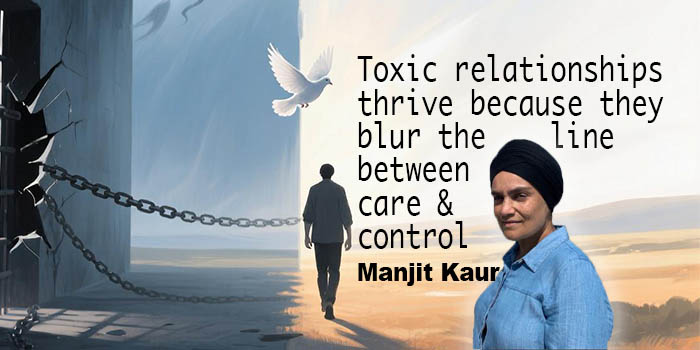
By Manjit Kaur, UK | Opinion |
Toxic relationships are not confined to one culture, one community or one kind of family. They exist in every corner of society, among friends, families, couples and even professional groups. But what makes them so difficult to recognise is that they often disguise themselves as loyalty, duty and belonging. On the surface, they appear supportive and secure. Who doesn’t like to be with family to celebrate happy occasions! For sure there are families that can and do offer security, love and support. But when it comes to dysfunctional relationships, often underneath the surface, groups, family or otherwise, can be a source of manipulation, control and suffering.
At first, relationships may seem like threads of connection, giving comfort and safety. But over time, those same threads tighten, restricting movement, leaving you stuck and drained without realising how you got there. Such relationships can be dehumanising for those trapped within them, resulting in pain and suffering. Another way to imagine toxic relations is through the metaphor of playground roundabout. In the beginning, as you step onto the roundabout, there is laughter and excitement, but as everyone pushes with their feet and the roundabout speeds up, very soon the momentum can become overwhelming. For some, frightening. Nobody is steering, yet everyone is spinning, pulled into cycles of blame, duty, guilt and pain. What appears as connection is entrapment, with each person being drawn into maintaining the spinning roundabout. The only option is to jump off and risk harm. And the fear of letting go means you decide to hold on even tighter to the toxic relationship.
The Hidden Nature of Toxicity
Toxic relationships thrive because they blur the line between care and control. You may be given affection, even moments of tenderness, only to be torn down later, made to feel small, incapable, or dependent. Attempts to assert your individuality are often belittled. Over time, you begin to doubt yourself: Am I overreacting? Am I the problem? Do I deserve this?
These patterns are not limited to any particular relationships; they can be found in a wide range of friendships, families, workplaces and communities. Across cultures, the common thread is control disguised as love and care, loyalty used as leverage, and conformity demanded at the expense of being true to yourself.
The Toll on the Individual
The impact of such relationships is profound. Confusion becomes your constant companion. One moment you are happy, the next you are in despair. You no longer know how to behave, what to say, or who you are. Many describe the experience as mentally exhausting, like being drained of energy and identity.
This is why so many people remain stuck in toxic relationships which can result in both mental and physical ill-health. They hold onto hope that things will change, that the cycle will break, that those around them will finally see their pain. But the roundabout spins on. The deeper tragedy is that victims often blame themselves, convinced that they are at fault, when the fault lies in the manipulative structures and people around them.
The Pin-Drop Moment
And yet, within the maze of toxic relationships, where it seems impossible to escape, in moments of quiet reflection or in conversation with trusted friends, hope can emerge. You see even in the darkest of moments, the flame of hope can emerge; A small inner voice whispers, this is not my fault!
This is the pin-drop moment representing the beginning of the first step on the path to freedom. Once you glimpse the cycle for what it is, your perspective rapidly changes, and the spell of control can begin to weaken. The possibility of stepping off the roundabout, though terrifying, starts to feel possible. Questions arise: Can I survive outside of this? Will I be alone? Will life get better? The answers are rarely immediate, but once your mindset changes and you rid yourself of guilt and start thinking of your needs and happiness, the old patterns of control being to unravel.
The Courage to Step Off
Leaving a toxic relationship, whether with a partner, family, friend or group, requires immense courage. Those who walk away are rarely celebrated. They may be accused of betrayal, selfishness or ingratitude. They may even be branded as dishonourable and worse. For women, in particular, the weight is often heavier, as they are expected to uphold traditions and keep families together.
Yet, the truth is clear. The one who steps away is not the problem. To step away is not to betray, but an act of resistance and survival. It is an act of self-respect, of reclaiming dignity, of saying no more. It is the refusal to keep apologising or feeling guilty, but deciding to breathe again, to live again and, not in an egotistical way, to re-learn to love and value yourself as a human being.
Towards Healing and Renewal
Healing does not come overnight. The scars of manipulation, guilt and self-doubt take time to heal. Support from friends, therapy, faith or communities grounded in compassion rather than control can be vital. Setting small boundaries, such as saying no to unreasonable demands or carving out space for self-care, can mark the first steps to freedom.
Gradually, life off the roundabout becomes possible. Because of conditioning, it may feel lonely and sad at first, but with time can come peace, strength, healing and self-respect. And when one person steps away, it creates ripples. Others trapped in similar cycles begin to see that another path is possible. Even long-standing patterns can break, offering future generations the possibility of freedom rather than fear.
Finding the Way Forward
For those who recognise themselves in this article, the path ahead may feel daunting, yet it begins with small steps. The first is to recognise the signs: a healthy relationship should nurture growth, not diminish it. When you find yourself drained rather than uplifted, it is worth pausing to reflect on what is truly happening.
From there, it is important to seek safe support. Turn to those outside the toxic cycle who can listen to you without judgement and offer perspective without pressure. Even the simple act of being heard can begin to restore a sense of self-worth and respect.
Setting boundaries, however modest, is another crucial step. These do not need to be dramatic or final at the outset; starting with manageable actions helps to build confidence. At the same time, it is helpful to reframe the idea of loyalty. Genuine loyalty is rooted in compassion, not in blind obedience. To step away from a destructive cycle is not an act of selfishness, it is an affirmation of survival and self-respect.
Conclusion
Toxic relationships exist everywhere, in families, friendships, communities and workplaces. They thrive on control, guilt and silence, keeping individuals trapped in endless cycles. But with courage, awareness and support, it is possible to step away and regain your dignity and freedom. To leave is not to betray love or loyalty, but to reclaim them in your own terms. And when even one person chooses to step off the toxic roundabout, no doubt others will follow.

Manjit Kaur, a UK-based therapist and counsellor, is a presenter at the 1 Show Live at Panjab Broadcasting Channel, UK. She can be contacted via email at manjitkaur1show@gmail.com
RELATED STORY:
Valentine’s Day: A Sikh perspective on true love (Asia Samachar, 14 Feb 2024)
ASIA SAMACHAR is an online newspaper for Sikhs / Punjabis in Southeast Asia and beyond. You can leave your comments at our website, Facebook, Twitter, and Instagram. We will delete comments we deem offensive or potentially libelous. You can reach us via WhatsApp +6017-335-1399 or email: asia.samachar@gmail.com. For obituary announcements, click here

































